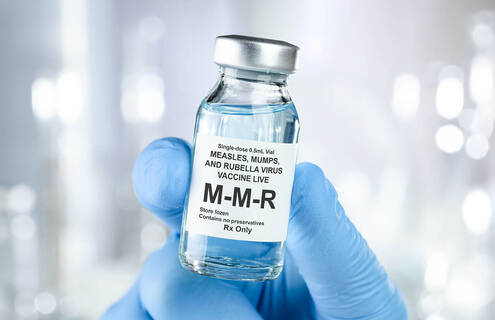
State officials have confirmed measles cases in New Hampshire and Vermont, beginning with an international traveler in Hanover, New Hampshire.
While the news is concerning, measles is increasing globally and so not unexpected. People who are not already protected by vaccination or by having had measles in the past are most at risk.
"At Dartmouth Health, we working closely with the Vermont Department of Health, the New Hampshire Department of Health and Human Services (DHHS), and local healthcare partners, to identify, notify, and connect to care for those who may have been exposed to these patients while infectious, and who do not already have protection against measles," says Deputy New Hampshire State Epidemiologist and Co-Interim Chief Dartmouth Hitchcock Medical Center Infectious Disease and International Health, Elizabeth Talbot, MD.
About the disease
Measles is a highly contagious viral illness–more contagious than COVID-19, says Talbot.
According to the CDC (Centers for Disease Control and Prevention), if one person has the disease, up to nine out of 10 people nearby will become infected if they are not protected. Symptoms appear seven to 14 days after contact with the virus.
Common measles symptoms include a high fever, cough, runny nose, conjunctivitis, and a rash. Complications can occur and they include ear infections and diarrhea. Pneumonia and encephalitis are also possible.
Protecting yourself
The best protection against measles is the MMR (measles, mumps, and rubella) vaccine. The vaccine provides long-lasting protection against all strains of measles.
Two doses of MMR vaccine are about 97% effective at preventing measles. One dose is about 93% effective.
"Measles can be a serious disease, so we are fortunate to have the MMR vaccine in our toolbox. Not only can it protect people from getting measles, mumps, and rubella, it can prevent the complications caused by these diseases," says Talbot.
How the virus spreads
Measles is a unique infection because it spreads through the air. When a person who has contagious measles coughs, the virus then can be suspended in the air for up to two hours—even after the infected person has left the area.
Those who are not vaccinated or who have not already had measles are at high risk of contracting and spreading the disease if exposed.
People with weakened immune systems may become infected even if they have been vaccinated. If exposed, they should talk to their healthcare provider for recommendations about other preventive treatments.
Those preventive treatments may include either vaccination within 72 hours after exposure or immune globulin. Immune globulin is a mixture of antibodies that, if given within six days of exposure, protects against the virus.
If you are showing symptoms
Early symptoms may include fever, cough, red eyes (conjunctivitis), runny nose, and feeling tired. After a few days of those symptoms, the rash starts.
Typically, measles is contagious for four days before the rash appears and four days after the rash appears. Symptoms generally develop 10 to 14 days after exposure, but may not appear for as long as 21 days.
Most measles patients recover within a week, but sometimes there are complications, such as ear infections that can lead to hearing loss, diarrhea, pneumonia, or even brain infection.
If you have not got a vaccination yet
For those one year old or over, contact your doctor to schedule a vaccination as soon as possible. Protection from vaccination builds over seven to 14 days after vaccination.
If you are not sure whether you have had your measles vaccinations, you can contact your provider to check your immunization history. According to the CDC, about 90% of the US population is immunized.
You also can ask your provider to do a blood test to see if your body has already made antibodies, which means you should be protected against future infections.
"Measles is on the rise globally," concludes Talbot. "It is disappointing but not surprising that we have spread of measles in the Upper Valley. The good news is that you can protect yourself and your family, but if you are not vaccinated, talk with your healthcare provider. If you have been exposed and are not vaccinated or have not had measles before, also talk with your healthcare provider to find immediate ways to avoid the disease."
New Hampshire and Vermont vaccination resources
The NH Immunization Program (NHIP) is a vaccine resource for healthcare providers, schools, childcare providers, families, and the general public. New Hampshire’s DHHS, through the NHIP's Vaccines for Children (or "VFC") program, provides all the recommended vaccines for every child in New Hampshire, regardless of insurance or income. DHHS urges individuals and caregivers to talk with their healthcare provider about which recommended vaccines are right for them.
The Vermont Department of Health provides information about measles, reminding people that measles is preventable when people get vaccinated. They also point out that even though measles was declared eliminated in the United States in the year 2000, outbreaks can happen in communities with low immunization rates.
To get answers to common questions about measles, watch this July 11, 2024 video by Michael S. Calderwood, MD, MPH, Chief Quality Officer, Dartmouth Hitchcock Medical Center.